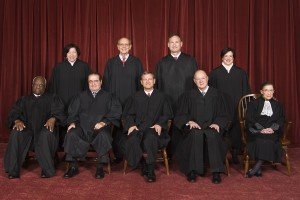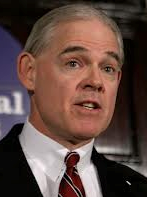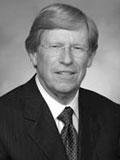
[fblike style=”standard” showfaces=”false” verb=”like” font=”arial”]
By Michael D. Peabody –
[dc]T[/dc]oday Proposition 8 supporters had the opportunity to be heard before the United States Supreme Court on why the voter-approved California constitutional amendment banning same-sex marriage should remain in place. Rather than preemptively deny the appeal case on the basis that the supporters of Proposition 8 did not have standing to step in for the governor, who had declined to defend the Proposition, the Justices allowed the argument on the merits to proceed.
The Court spent the remainder of the time addressing the question of whether the Equal Protection Clause of the Fourteenth Amendment prohibits the state of California from defining marriage as the union of one man and one woman.

Repeating the tactical mistakes that were made in the lower courts, the Proposition 8 advocate failed to make an argument that would pass the muster of the “rational basis” test to demonstrate that the state had any reasonable interest in preventing same-sex marriage, and lost any ability to frame the debate. Proposition 8 advocate Charles Cooper was quickly cornered into making an weak argument that procreation was essential to marriage, and then into making an equally absurd argument that generally one person in each marriage is fertile. The left wing of the Court had a field day with this position and a last ditch-effort of Justice Antonin Scalia to rescue Cooper from this trap failed because Scalia based it on a mistaken assumption that California banned same-sex couples from adopting children.
Justice Elena Kagan immediately framed the issue by pointing out that same-sex marriage ban proponents’ argument boiled down to the idea of procreation. “In reading the briefs, it seems as though your principal argument is that same-sex and opposite-sex couples are not similarly situated because opposite-sex couples can procreate, same-sex couples cannot, and the State’s principal interest in marriage is in regulating procreation. Is that basically correct?”
Cooper responded, “Your Honor, that’s the essential thrust of our — our position, yes.”
Cooper followed with an argument that society is not ready for same-sex marriage because of “what the long-term implications of profound redefinition of a bedrock social institution would be” and that California voters should have the opportunity to see what happens in Massachusetts where same-sex marriage has been legal for four years to see what happens there.
Justice Antonin Scalia then expressed frustration that Cooper did not bring up anything “concrete” and tried to help Cooper out by providing a “concrete thing” albeit factually faulty. Scalia continued, “If you redefine marriage to include same-sex couples, you must — you must permit adoption by same-sex couples, and there’s — there’s considerable disagreement among — among sociologists as to what the consequences of raising a child in a — in a single-sex family, whether that is harmful to the child or not.”
Justice Ruth Bader Ginsberg quickly pointed out that same-sex couples do have the right to adopt in California and Scalia responded that even then, we still don’t know whether that is helpful or harmful to children. He then asked Cooper if same-sex adoption hurts or helps children and Cooper responded that he did not know either.
Justice Anthony Kennedy pointed out that more than 40,000 children in California that live with same-sex parents and that those children might have an interest in having parents who were married. Cooper responded that it was still up for debate.
Cooper tried to refocus the argument on the issue of procreation. “The concern is that redefining marriage as a genderless institution will sever its abiding connection to its historic traditional procreative purposes, and it will refocus, refocus the purpose of marriage and the definition of marriage away from the raising of children and to the emotional needs and desires of adults, of adult couples.”
Kagan interrupted, “Mr. Cooper, suppose a State said that, ‘Because we think that the focus of marriage really should be on procreation, we are not going to give marriage licenses anymore to any couple where both people are over the age of 55.’ Would that be constitutional?”
Cooper responded that it would not be constitutional. He followed up by saying, “Your Honor, even with respect to couples over the age of 55, it is very rare that both parties to the couple are infertile….”
Scalia quipped that, “I suppose we could have a questionnaire at the marriage desk when people come in to get the marriage — you know, Are you fertile or are you not fertile?”
After a brief discussion about fidelity and marriages involving prison inmates, Cooper’s time was up and Theodore Olson began his arguments against Proposition 8.
After a discussion in which Olson claimed Proposition 8 proponents lacked standing to be heard, Chief Justice John Roberts raised a point that excluding same-sex couples from marriage was not the same as excluding a particular group since the institution of marriage “developed to serve purposes that, by their nature, didn’t include homosexual couples.”

Scalia then tried to get Olson to describe the point in time when it became unconstitutional to exclude same-sex couples from marriage. After some back and forth discussion, Olson said the exclusion became unconstitutional when “we — as a culture determined that sexual orientation is a characteristic of individuals that they cannot control.”
Scalia asked for a specific date again, and Olson said, “in — the case that’s before you today, California decided — the citizens of California decided, after the California Supreme Court decided that individuals had a right to get married irrespective of their sexual orientation in California, and then the Californians decided in Proposition 8, wait a minute, we don’t want those people to be able to get married.”
Olson dismissed the procreation argument claiming that it was not essential to procreate in order to be married.
There was some discussion over whether it would be unconstitutional only in California or in all of the states. After discussing the concept that California already provides same-sex couples with every state right other than the right to call it a marriage, Roberts said, “So it’s just about — it’s just about the label in this case.”
Olson distinguished same-sex marriage from polygamy. “Well, you’ve said — you’ve said in the cases decided by this Court that the polygamy issue, multiple marriages raises questions about exploitation, abuse, patriarchy, issues with respect to taxes, inheritance, child custody, it is an entirely different thing.”
Olson continued that prohibiting polygamy was prohibiting “conduct” whereas prohibiting same-sex marriage was prohibiting the status of homosexuals.
Donald B. Verrilli, Solicitor General, then addressed the court as an amicus. “I do think the problem here with the arguments that Petitioners are advancing is that California’s own laws do cut the legs out from under all of the justifications that Petitioners have offered in defense of Proposition 8.”
Near the end of his arguments, Justice Samuel Alito signaled an interest in returning the issue to the states for decision rather than rendering a decision as a Court. “The one thing that the parties in this case seem to agree on is that marriage is very important. It’s thought to be a fundamental building block of society and its preservation essential for the preservation of society. Traditional marriage has been around for thousands of years. Same-sex marriage is very new. I think it was first adopted in The Netherlands in 2000. . . . But you want us to step in and render a decision based on an assessment of the effects of this institution which is newer than cell phones or the Internet? I mean we — we are not — we do not have the ability to see the future. On a question like that, of such fundamental importance, why should it not be left for the people, either acting through initiatives and referendums or through their elected public officials?”
Verilli responded that the Court should rule on the issue since there are issues at stake that will not be fixed by waiting, including the rights of children of same-sex couples who should have the right to say their parents are married.
Cooper then returned to the podium for his rebuttal argument. After some more questions about whether Court should have granted review, Cooper said, “it is true, as the people of California believe that it still is true, that the natural procreative capacity of opposite-sex couples continues to pose vitally important benefits and risks to society, and that’s why marriage itself is the institution that society has always used to regulate those heterosexual, procreative — procreative relationships.
Cooper concluded, “That democratic debate, which is roiling throughout this country, will definitely be coming back to California. It is an agonizingly difficult, for many people, political question. We would submit to you that that question is properly decided by the people themselves.”
The matter was submitted.
At this point, it appears that the conservative wing of the Court is interested in sending the case back to the state rather than ruling on the issue while the liberal wing is interested in upholding the opinions of Judge Walker and the Ninth Circuit which found Proposition 8 was unconstitutional. The decision is anticipated to be released in June.
A full transcript and an MP3 of the Audio is available at HOLLINGSWORTH v. PERRY. The Oyez Project at IIT Chicago-Kent College of Law. 26 March 2013. .
